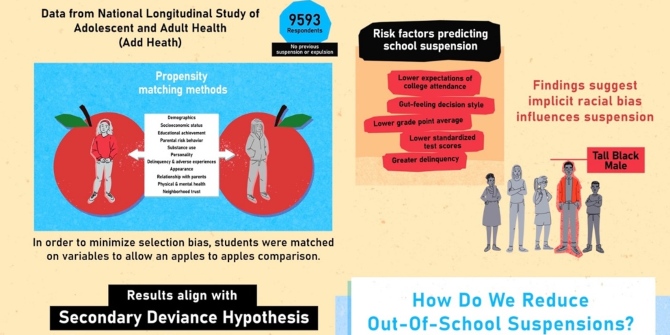 Is having a friend from the opposite gender a help or a hindrance to getting good grades in high school? In new research using data on high school friendship networks and academic achievement, Andrew J. Hill finds that a ten percent increase in opposite gender friends reduces a students’ GPA score by 0.1 points. He writes that this effect on students can be found in mathematics and science subjects, but not in English and history.
Is having a friend from the opposite gender a help or a hindrance to getting good grades in high school? In new research using data on high school friendship networks and academic achievement, Andrew J. Hill finds that a ten percent increase in opposite gender friends reduces a students’ GPA score by 0.1 points. He writes that this effect on students can be found in mathematics and science subjects, but not in English and history.
Are opposite gender friends in high school a distraction or do they promote better academic achievement? This is a question many parents ask as they consider the type of educational environment they would like for their teenage child, but, perhaps surprisingly, it is something about which little is known. New evidence indicates that worried parents may have been right all along: opposite gender friends are associated with lower grades in high school. Furthermore, students with more opposite gender friends are also more likely to report difficulties getting along with the teacher and paying attention in class.
Although the question above seems simple, it is difficult to answer. The challenge is isolating the effect of opposite gender friends from other factors. For example, supportive parents may encourage their son to play in the school band – where he meets and befriends more girls than if he were playing video games at home – as well as regularly check that he is doing his homework – resulting in better grades. It would be easy to mistakenly attribute the teenager’s good school performance to his opposite gender friends rather than his parents’ involved parenting. Similarly, you could imagine that confidence and assertiveness in a teenage girl may cause her to both perform better academically and have more opposite gender friends, but it would be clearly wrong to conclude that her opposite gender friends cause her high grades.
To get around this, something that randomly causes one student to have more opposite gender friends than another student is needed. The gender composition of schoolmates who live close to the student, such as on the same block, can be used to do precisely this. The following example (taken from our research) explains the idea:
Alice and Barbara attend the same school, are in the same grade, and have very similar home environments. They both also live next door to someone who attends the same school. Alice lives next door to a boy, Charles, and Barbara lives next door to a girl, Debbie. Alice catches the bus with Charles, they are friends, and, in addition, Alice has become friends with some of Charles’s (mostly male) friends. Barbara and Debbie also catch the bus together, they are friends, and Barbara is also friends with some of Debbie’s (mostly female) friends. As a result, Alice has a larger share of male friends than Barbara. This arose by chance, as both Alice’s and Barbara’s parents did not know the gender of their neighbors’ children when they chose where to live even though both may have based their choices on a variety of other factors, such as income and the proximity to a good school.

Now, any difference in school achievement between Alice and Barbara can be partly attributed to the gender composition of their friendship groups. If we observe enough students like Alice and Barbara, we can make enough comparisons to generalize the results. Using this strategy with US data on high school friendship networks and academic achievement, we find that a 10 percent increase in opposite gender friends reduces GPA scores by 0.1 points (where GPA scores are between 0 and 4).
So what is it about opposite gender friends that cause lower grades? Rather than opposite gender friends increasing the time spent with friends outside school or the potentially risky behavior associated with teenage partying – arguably the channel parents are most concerned about – evidence indicates that effects operate inside the classroom. Students with more opposite gender friends report more difficulties relating to their teacher and concentrating in class. It seems opposite gender friends are distracting in the classroom – arguably an unsurprising result. At the same time, opposite gender friends increase the likelihood of being in a romantic relationship, although whether this aggravates or mitigates the classroom effect is unclear.
The finding that opposite gender school friends reduce grades certainly cannot be interpreted as evidence that single sex education is better for students, of course – there are several factors other than school friends to consider – but the difficulties getting along with the teacher and paying attention in class may be eliminated in single-sex classrooms that exclude opposite gender friends. Furthermore, the negative effects of opposite gender friends for younger students are found in mathematics and science and not in English and history. This provides a dimension of empirical support for educators using single-sex mathematics and science classrooms in mixed gender schools, which, according to the National Association for Single Sex Public Education in the US, is increasingly common.
The negative effect of opposite gender friends on cognitive educational outcomes is moderate, but provides more evidence that the gender of peers matters in high school. Reorganizing classroom gender composition is a relatively low-cost policy as it need not require more teachers or resources. The potential for doing so to boost educational outcomes should be recognized along with the need for continued research on the topic – both to improve our understanding of the other channels through which classroom gender composition may affect achievement, and, importantly, exploring effects on noncognitive outcomes and personality traits.
This article is based on the paper, ‘The Girl Next Door: The Effect of Opposite Gender Friends on High School Achievement’, in American Economic Journal: Applied Economics.
Featured image credit: Medill News21 (CC-BY-2.0)
Please read our comments policy before commenting.
Note: This article gives the views of the author, and not the position of USAPP – American Politics and Policy, nor of the London School of Economics.
Shortened URL for this post: http://bit.ly/1Nx9xZD
_________________________________
 Andrew Hill – University of South Carolina
Andrew Hill – University of South Carolina
Andrew Hill is an Assistant Professor in the Darla Moore School of Business at the University of South Carolina. His research interests are in the economics of education and labor economics. His recent work explores how the ability and gender of peers affects academic outcomes in high school and college.







Interesting. Is this then an indictment on co-ed institutions? I went to a boys only school so I wouldn’t know.At thee university it didn’t seem to matter.